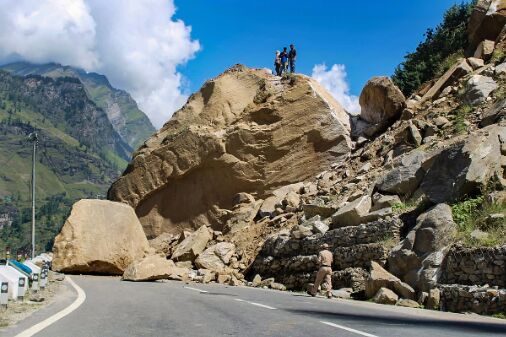Crisis of our age
If climate change aberrations have emerged as a structural problem, the solution too has to come through better planning

The earth is in flames somewhere and in others, it is under water. Rivers have stopped flowing in some places while in others, rocks from mountains are flowing down with enormous velocity causing unprecedented death and destruction.
These phenomena may be older than human civilization — being with it all throughout its course of evolution. The civilizational evolution — with flourishes and decline — is itself shaped by the manner and extent of humans' interaction with nature. Their threatening form, intensity, and frequency in the current time is, however, a worrying factor. These threatening phenomena indicate the fallacy on the part of humans in recklessly hampering our relation with nature.
A large part of the damage done to nature is irreversible and we will have to continue living in deteriorated surroundings with self-imposed restrictions. But still, there is a lot to prevent from getting trapped into a worse scenario.
As we are heading towards the COP26 climate conference to be held in Glasgow in November, all the nations should act on their promises of contributing their part of action to limit the global heating to the prescribed level.
Global phenomena
Apart from the pandemic that has been tormenting the entire world for over a year now, humans parallelly bore the brunt of natural disasters all across the globe. The wounds inflicted by the slurry of tropical cyclones along both the eastern and western coast of India in the last year are still fresh. The Uttarakhand mudslide once again threw the reminiscent of the 2013 catastrophe. Severe floods and flash floods across the country in states ranging from Assam in the Northeast to Kerala and Karnataka in the south — apart from the river plains in central India — have wreaked unprecedented havoc in some cases.
The situation is no better elsewhere. Just a few months back, China was struggling with one of the most severe floods in its history — affecting more than 11 million people. Nature's revenge on Germany was equally merciless as the country was ravaged by once in a century flood.
Towards the south, Australia is still struggling to make up for the humongous losses it incurred during the bushfires expanding from the last months of 2019 to the early months of 2020. The total area across which the fire raged was 74,000 square kilometres — that will surpass the total land area of many countries. Amazon too has witnessed massive forest fires lately. Apart from inflicting human settlements, forest fires burn down speechless lifeforms of the forests. Also, not to forget its monstrous ecological footprint.
As per a UN report, between the period 1970-2019, Africa recorded 1,695 disasters, causing the loss of 7,31,747 lives and USD five billion economically. Poorer nations including Ethiopia, Mozambique and Sudan have been the worst sufferers in the continent. These incidents just suggest that nature is sparing no part of the Earth.
Cascading effects
Every natural disaster has a socio-economic fallout that costs people much more than the disaster itself. Receding floods leave behind them a dingy atmosphere, creating a space for vector-borne diseases. In most cases across rural areas, these ailments and death are digested in the belly of ignorant society; they even fail to make headlines. To be sure, the effects of natural disasters are inadequately documented. Accordingly, provisioning of relief and compensation as well as the implementation of mitigation and adaptation methods remain well below the mark.
The severity of seasonal floods in some of the flood-prone states of India has increased over the past few years. The residents of the affected region persistently remain under the shadow of flood effects and after-effects for most of the year. It becomes highly pertinent here to state that concerned authorities or institutions should prepare accountability reports documenting their efforts and the quantum of positive impact achieved. This is the least that one could expect from the government.
Other natural disasters also have their own set of socio-economic fallouts. Droughts could leave a streak of malnourishment behind them. Extreme weather events including cyclones and landslides also leave behind them the need for reconstruction of personal properties. For average and poor households, the construction of a single house may mean years of family income.
Solutions
If climate change aberrations have emerged as a structural problem, the solution has to come through better planning. Surely, there cannot be a similar set of planning to mitigate and adapt to the varied set of natural disasters — the minutes will differ. But the basics have to be intact: there has to be political will, appropriate funding, aware masses, stricter regulations and proper monitoring and evaluation procedure for all the disasters in general.
The ambiguities surrounding the linkage of natural disasters and climate change have been removed. To hit at the core of the problem, the focus primarily has to be on reducing greenhouse gases emissions and creating natural as well as artificial carbon sinks. Fortunately, we don't need some rocket science to do so. It is common knowledge — among both educated and uneducated masses — that what things are good and bad for the environment. On the unfortunate side, the practice of that knowledge is lacking. Anthropogenic factors are key contributors to the depreciating situation.
The biggest transformations do spring up from the heart of society. The world is in want of young and spirited icons who would lead by example — inspiring millions. Every crisis awaits leaders who would reincarnate it into an opportunity and, to this greatest crisis of our age, young leaders should rise — from India, from the rest of the world and integrate their efforts into a decisive whole. Social awareness and action will thus have to be incorporated in domestic and global politics.
This apparently utopian vision may prove to be the best course of action. Collective consciousness gained our Independence 74 years ago, inspiring leaders uprooted social evils like the Sati system and restrictions on women education and widow remarriage some 200 years back. Won't it set us free from this biggest crisis of the day?
Views expressed are personal



